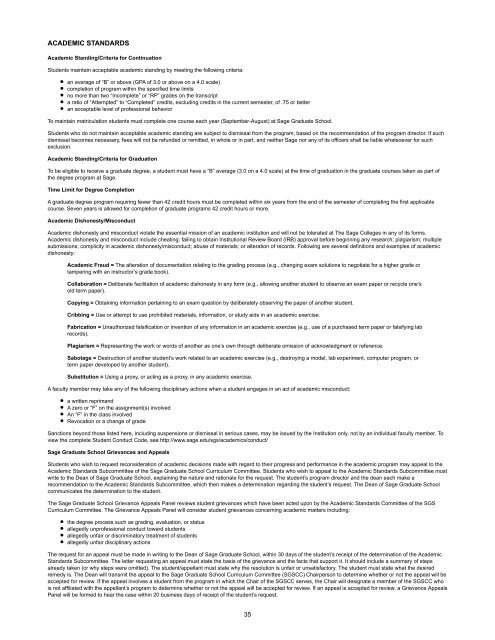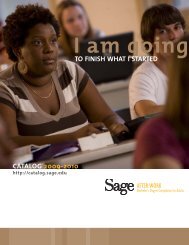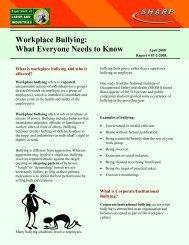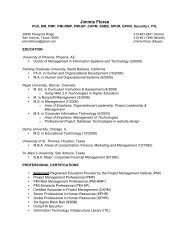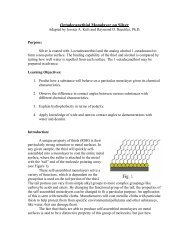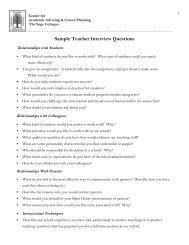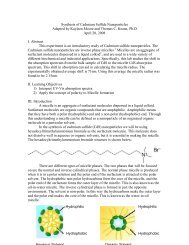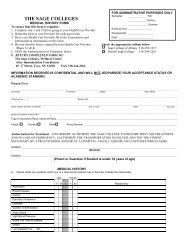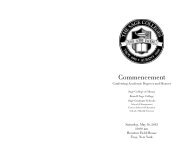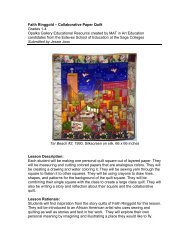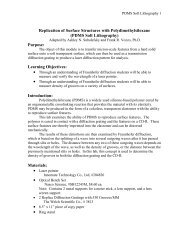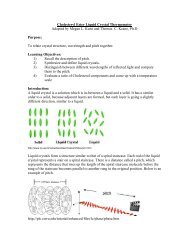2009-2010 - Catalog Sage - The Sage Colleges
2009-2010 - Catalog Sage - The Sage Colleges
2009-2010 - Catalog Sage - The Sage Colleges
You also want an ePaper? Increase the reach of your titles
YUMPU automatically turns print PDFs into web optimized ePapers that Google loves.
ACADEMIC STANDARDSAcademic Standing/Criteria for ContinuationStudents maintain acceptable academic standing by meeting the following criteria:an average of “B” or above (GPA of 3.0 or above on a 4.0 scale)completion of program within the specified time limitsno more than two “Incomplete” or “RP” grades on the transcripta ratio of “Attempted” to “Completed” credits, excluding credits in the current semester, of .75 or betteran acceptable level of professional behaviorTo maintain matriculation students must complete one course each year (September-August) at <strong>Sage</strong> Graduate School.Students who do not maintain acceptable academic standing are subject to dismissal from the program, based on the recommendation of the program director. If suchdismissal becomes necessary, fees will not be refunded or remitted, in whole or in part, and neither <strong>Sage</strong> nor any of its officers shall be liable whatsoever for suchexclusion.Academic Standing/Criteria for GraduationTo be eligible to receive a graduate degree, a student must have a “B” average (3.0 on a 4.0 scale) at the time of graduation in the graduate courses taken as part ofthe degree program at <strong>Sage</strong>.Time Limit for Degree CompletionA graduate degree program requiring fewer than 42 credit hours must be completed within six years from the end of the semester of completing the first applicablecourse. Seven years is allowed for completion of graduate programs 42 credit hours or more.Academic Dishonesty/MisconductAcademic dishonesty and misconduct violate the essential mission of an academic institution and will not be tolerated at <strong>The</strong> <strong>Sage</strong> <strong>Colleges</strong> in any of its forms.Academic dishonesty and misconduct include cheating; failing to obtain Institutional Review Board (IRB) approval before beginning any research; plagiarism; multiplesubmissions; complicity in academic dishonesty/misconduct; abuse of materials; or alteration of records. Following are several definitions and examples of academicdishonesty:Academic Fraud = <strong>The</strong> alteration of documentation relating to the grading process (e.g., changing exam solutions to negotiate for a higher grade ortampering with an instructor’s grade book).Collaboration = Deliberate facilitation of academic dishonesty in any form (e.g., allowing another student to observe an exam paper or recycle one’sold term paper).Copying = Obtaining information pertaining to an exam question by deliberately observing the paper of another student.Cribbing = Use or attempt to use prohibited materials, information, or study aids in an academic exercise.Fabrication = Unauthorized falsification or invention of any information in an academic exercise (e.g., use of a purchased term paper or falsifying labrecords).Plagiarism = Representing the work or words of another as one’s own through deliberate omission of acknowledgment or reference.Sabotage = Destruction of another student’s work related to an academic exercise (e.g., destroying a model, lab experiment, computer program, orterm paper developed by another student).Substitution = Using a proxy, or acting as a proxy, in any academic exercise.A faculty member may take any of the following disciplinary actions when a student engages in an act of academic misconduct:a written reprimandA zero or “F” on the assignment(s) involvedAn “F” in the class involvedRevocation or a change of gradeSanctions beyond those listed here, including suspensions or dismissal in serious cases, may be issued by the Institution only, not by an individual faculty member. Toview the complete Student Conduct Code, see http://www.sage.edu/sgs/academics/conduct/<strong>Sage</strong> Graduate School Grievances and AppealsStudents who wish to request reconsideration of academic decisions made with regard to their progress and performance in the academic program may appeal to theAcademic Standards Subcommittee of the <strong>Sage</strong> Graduate School Curriculum Committee. Students who wish to appeal to the Academic Standards Subcommittee mustwrite to the Dean of <strong>Sage</strong> Graduate School, explaining the nature and rationale for the request. <strong>The</strong> student’s program director and the dean each make arecommendation to the Academic Standards Subcommittee, which then makes a determination regarding the student’s request. <strong>The</strong> Dean of <strong>Sage</strong> Graduate Schoolcommunicates the determination to the student.<strong>The</strong> <strong>Sage</strong> Graduate School Grievance Appeals Panel reviews student grievances which have been acted upon by the Academic Standards Committee of the SGSCurriculum Committee. <strong>The</strong> Grievance Appeals Panel will consider student grievances concerning academic matters including:the degree process such as grading, evaluation, or statusallegedly unprofessional conduct toward studentsallegedly unfair or discriminatory treatment of studentsallegedly unfair disciplinary actions<strong>The</strong> request for an appeal must be made in writing to the Dean of <strong>Sage</strong> Graduate School, within 30 days of the student’s receipt of the determination of the AcademicStandards Subcommittee. <strong>The</strong> letter requesting an appeal must state the basis of the grievance and the facts that support it. It should include a summary of stepsalready taken (or why steps were omitted). <strong>The</strong> student/appellant must state why the resolution is unfair or unsatisfactory. <strong>The</strong> student must state what the desiredremedy is. <strong>The</strong> Dean will transmit the appeal to the <strong>Sage</strong> Graduate School Curriculum Committee (SGSCC) Chairperson to determine whether or not the appeal will beaccepted for review. If the appeal involves a student from the program in which the Chair of the SGSCC serves, the Chair will designate a member of the SGSCC whois not affiliated with the appellant’s program to determine whether or not the appeal will be accepted for review. If an appeal is accepted for review, a Grievance AppealsPanel will be formed to hear the case within 20 business days of receipt of the student’s request.35


